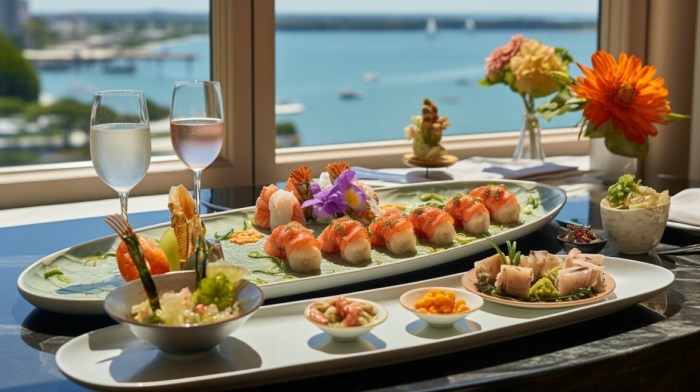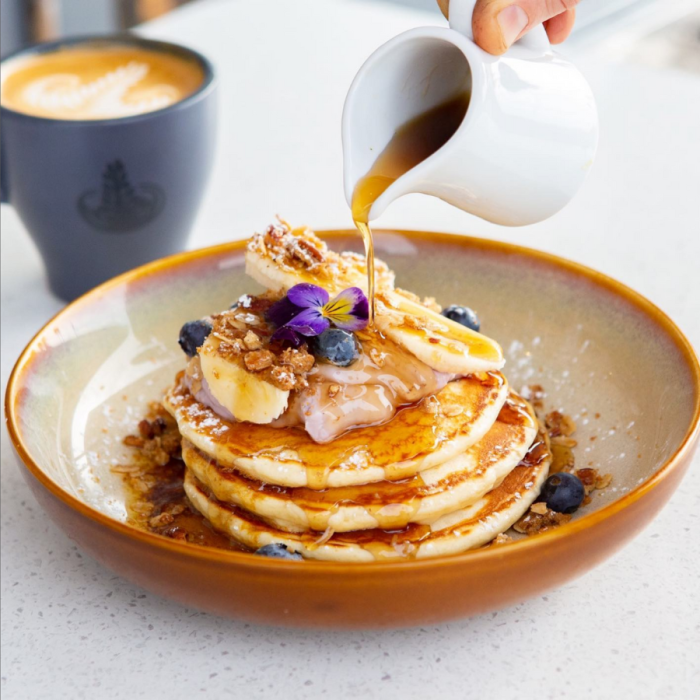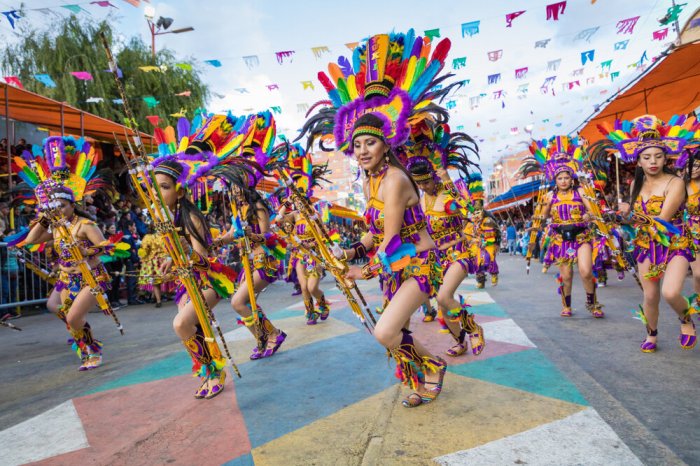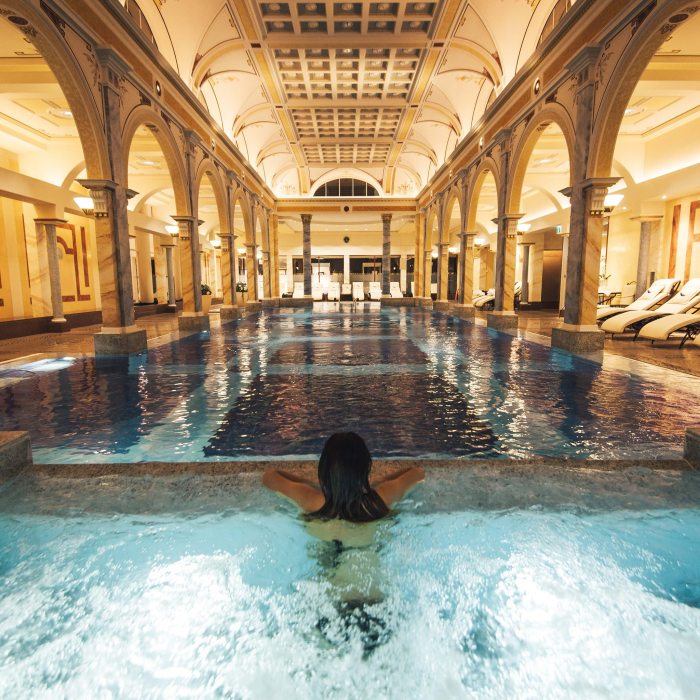
Gourmet Travel Experiences for Foodies offer more than just a culinary adventure; they provide a deeply immersive journey into the heart of a region’s culture and gastronomy. From exclusive private island escapes to luxurious train journeys across stunning landscapes, these experiences cater to the discerning palate and a desire for unique, unforgettable moments. This exploration delves into the various facets of gourmet travel, examining the defining characteristics, diverse types of experiences available, and the luxury elements that elevate them to extraordinary heights.
We’ll also touch upon the importance of sustainable practices and responsible tourism within this context.
Whether you’re dreaming of learning the secrets of French pastry in a Parisian cooking class, embarking on a wine tour through the rolling hills of Tuscany, or savoring Michelin-starred meals on a private island, this guide provides a comprehensive overview of the world of gourmet travel, empowering you to plan your own bespoke culinary escape.
Types of Gourmet Travel Experiences for Foodies
Gourmet travel experiences offer a unique blend of culinary exploration and cultural immersion, appealing to discerning palates and adventurous spirits. These experiences go beyond simply eating; they provide opportunities to learn, connect, and deeply engage with the food and its origins. The options are diverse, catering to various interests and preferences, ensuring there’s a perfect gourmet getaway for every foodie.
Several categories of gourmet travel experiences cater to different interests and preferences, offering unique opportunities for culinary exploration and cultural immersion.
Cooking Classes
Cooking classes offer an immersive experience, allowing participants to learn the techniques and secrets behind regional cuisines. These classes often involve hands-on participation in preparing dishes, followed by a delightful meal featuring the creations of the class. The appeal lies in gaining practical skills, understanding culinary traditions, and creating lasting memories through shared culinary experiences. For example, a hands-on pasta-making class in Bologna, Italy, would teach participants the art of creating fresh pasta from scratch, using traditional techniques and local ingredients.
This experience goes beyond simply eating pasta; it’s about understanding the process, the ingredients, and the cultural significance of this beloved dish.
Wine Tours
Wine tours provide an opportunity to explore vineyards, sample diverse wines, and learn about the winemaking process from grape to glass. These tours often include visits to wineries, guided tastings, and insightful discussions about terroir, grape varietals, and wine production techniques. The allure is the sensory experience of tasting fine wines, understanding the nuances of different varieties, and appreciating the artistry and craftsmanship involved in winemaking.
A tour of the Napa Valley in California, for instance, would expose participants to world-renowned wineries, allowing them to sample Cabernet Sauvignon, Chardonnay, and other varietals, while learning about the region’s unique terroir and winemaking history.
Food Festivals
Food festivals are vibrant celebrations of local cuisine and culture. These events often feature a wide array of food stalls, live music, cooking demonstrations, and other entertainment. The attraction is the opportunity to sample a diverse range of culinary offerings, experience the local atmosphere, and immerse oneself in the festive spirit. The annual Taste of Chicago, for example, showcases a wide variety of Chicago’s diverse culinary scene, allowing visitors to sample everything from deep-dish pizza to gourmet tacos.
Sample Week-Long Gourmet Travel Itinerary: Tuscany, Italy
This itinerary focuses on Tuscan cuisine, combining cooking classes, wine tours, and visits to local markets.
A week-long itinerary provides ample time for a deep dive into the culinary delights of Tuscany. This structured approach balances learning, tasting, and cultural exploration, offering a well-rounded gourmet experience.
| Day | Activity |
|---|---|
| 1 | Arrival in Florence, check into accommodation, explore the Oltrarno neighborhood. |
| 2 | Hands-on pasta-making class in Florence, followed by a delicious lunch featuring the class’s creations. |
| 3 | Day trip to the Chianti region, visiting vineyards and participating in wine tastings. |
| 4 | Visit a local market in Siena, followed by a cooking demonstration showcasing traditional Tuscan dishes. |
| 5 | Cooking class focused on regional specialties, such as ribollita and Florentine steak. |
| 6 | Explore the culinary scene of Florence, visiting trattorias and enjoying authentic Tuscan meals. |
| 7 | Departure from Florence. |
Gourmet Experiences for Specific Dietary Restrictions
Many gourmet travel experiences now cater to specific dietary restrictions, offering customized options for vegetarians, vegans, and those with gluten-free needs. These experiences ensure that individuals with dietary restrictions can still fully enjoy the culinary aspects of their travels. For example, a vegan cooking class in Southeast Asia might focus on preparing delicious and authentic plant-based dishes using local ingredients.
Similarly, a gluten-free tour of Italy could focus on exploring restaurants and food producers that specialize in gluten-free options. These tailored experiences demonstrate a growing awareness and commitment to inclusivity within the gourmet travel industry.
Luxury Elements in Gourmet Travel

Gourmet travel transcends mere culinary exploration; it’s an immersive experience that elevates the senses and indulges the palate. Luxury plays a pivotal role in enhancing this journey, transforming a simple food tour into an unforgettable memory. The combination of exceptional cuisine and luxurious amenities creates a truly bespoke and personalized adventure.Luxury accommodations are integral to a refined gourmet travel experience.
They provide a sanctuary where travelers can relax and rejuvenate after a day of culinary discoveries.
Luxury Accommodations and Their Role
The finest hotels and resorts offer more than just a place to sleep; they provide a curated experience. Imagine waking up in a suite with breathtaking views, enjoying a private balcony overlooking a vineyard, or relaxing in a spa after a Michelin-starred meal. These accommodations often include exclusive amenities like private butlers, curated wine cellars, and personalized wellness programs designed to complement the gourmet journey.
The level of service and attention to detail ensures a seamless and luxurious experience, making the entire trip feel special. Properties like The Ritz-Carlton, Four Seasons, and Aman resorts consistently exemplify this level of refined hospitality.
High-End Transportation Options
High-end transportation options are another key component of luxurious gourmet travel. Private jets offer unparalleled convenience and speed, allowing travelers to reach remote culinary destinations efficiently and in style. The privacy and personalized service offered on a private jet significantly reduce travel stress and enhance the overall experience. Similarly, luxury trains, like the Orient Express or the Rocky Mountaineer, transform the journey itself into a memorable part of the experience, offering gourmet dining and stunning scenery along the way.
These modes of transportation enhance the overall sense of occasion and exclusivity, making the entire journey feel like a celebration.
Exclusive Travel Services
Exclusive travel services further elevate the luxury aspect of gourmet travel. A personal chef, for example, can prepare customized meals using locally sourced ingredients, ensuring a truly personalized culinary experience. Private dining experiences in unique settings, such as a private vineyard or a historic castle, add a touch of exclusivity and romance. These personalized services cater to individual preferences, offering a level of customization and attention to detail that is unmatched in traditional travel experiences.
Imagine a private dinner prepared by a celebrated chef within the walls of a historic Tuscan villa, complete with a curated wine pairing – this exemplifies the heights of luxury gourmet travel.
High-End Travel Accessories
The right accessories can enhance the gourmet travel experience significantly. A carefully chosen selection of items elevates the enjoyment of food and drink, creating lasting memories.
- High-quality insulated wine bag: Keeps your favorite wines at the perfect temperature during travel, ensuring optimal enjoyment.
- Portable espresso maker: Allows you to start your day with a perfect espresso, no matter your location.
- Luxury picnic basket: Equipped with elegant plates, cutlery, and napkins, perfect for enjoying al fresco meals.
- High-end travel cutlery set: A compact yet elegant set for enjoying meals on the go, ensuring a refined dining experience.
- Gourmet food storage containers: Keeps your snacks and treats fresh and organized during your journey.
Marketing Gourmet Travel Experiences: Gourmet Travel Experiences For Foodies
Marketing gourmet travel experiences requires a sophisticated approach that resonates with discerning clientele seeking unparalleled culinary adventures. Success hinges on effectively communicating the unique value proposition and targeting the right audience through appropriate channels. This involves crafting compelling narratives that highlight the exclusivity and transformative nature of these experiences.
Effective marketing strategies for attracting high-end clientele necessitate a multi-faceted approach. It’s not simply about selling a trip; it’s about selling an experience, a memory, and a lifestyle. The focus should be on creating desire and conveying a sense of exclusivity and luxury.
Ideal Target Audience for Luxury Gourmet Travel Packages
The ideal target audience for luxury gourmet travel packages consists of affluent individuals and couples with a strong appreciation for fine dining, culture, and unique travel experiences. They are typically well-educated, have disposable income, and prioritize quality over quantity. This demographic often includes successful professionals, entrepreneurs, and retirees seeking enriching and memorable travel experiences. They are likely to be digitally savvy, using online platforms for research and booking, and appreciate personalized service and bespoke itineraries.
They may be interested in specific culinary regions or cuisines, or they might seek a broader exploration of food and culture.
Marketing Campaign Showcasing Unique Selling Propositions
A successful marketing campaign should emphasize the unique selling propositions of the gourmet travel experiences. This could involve highlighting exclusive access to Michelin-starred restaurants, private chef experiences, cooking classes with renowned chefs, behind-the-scenes tours of wineries or farms, and personalized itineraries tailored to individual preferences. High-quality photography and videography are crucial for showcasing the beauty of the destinations and the exquisite food.
The campaign could also feature testimonials from past clients, emphasizing the positive experiences and creating social proof. The overall message should convey a sense of luxury, exclusivity, and an unforgettable culinary journey. For example, a campaign could focus on a “Culinary Journey Through Tuscany,” showcasing images of rolling hills, sun-drenched vineyards, and exquisite Italian cuisine.
Comparison of Marketing Channels
Several marketing channels can be employed to reach the target audience. Social media platforms like Instagram and Facebook are ideal for visually showcasing the experiences, engaging with potential clients, and running targeted advertising campaigns. Print advertising in luxury travel magazines and newspapers can reach a more discerning audience, offering a sense of prestige and credibility. Collaborations with luxury travel agencies and concierge services provide access to a pre-qualified network of potential clients.
Email marketing allows for personalized communication and targeted offers to build relationships with potential clients. Each channel has its strengths and weaknesses, and a successful strategy will leverage a mix of these channels to maximize reach and impact. For example, a stunning Instagram post featuring a video of a private chef preparing a meal in a luxurious villa would complement a print advertisement in a luxury travel magazine, which would further enhance brand awareness and build credibility.
Utilizing travel agencies ensures access to a network already specializing in high-end clientele, while email marketing allows for ongoing communication and personalized offers.
Private Island Vacations and Related Luxury Offerings
Private island vacations represent the pinnacle of luxury travel, offering unparalleled seclusion, personalized service, and an escape from the everyday. For the discerning foodie, this translates to an immersive culinary journey, free from distractions and tailored to individual preferences. The exclusivity of a private island setting allows for bespoke dining experiences and access to the freshest, locally-sourced ingredients, elevating a gourmet getaway to an unforgettable adventure.Private island resorts cater to the needs of discerning foodies by offering a range of specialized services.
Culinary Customization and Bespoke Dining Experiences
Many private island resorts boast renowned chefs who create personalized menus based on guests’ dietary needs and preferences. This extends beyond simple allergies; chefs often collaborate with guests to design tasting menus showcasing regional specialties or incorporating specific ingredients they desire. The intimate setting allows for a close relationship between chef and guest, fostering a true culinary partnership.
For example, a resort might arrange a private beachside dinner with a menu crafted around the freshest seafood caught that day, or a cooking class focused on local cuisine, followed by a meal featuring the dishes created.
Access to Unique Ingredients and Local Cuisine
Private islands often have access to unique and locally-sourced ingredients that are unavailable elsewhere. This might include exotic fruits, rare spices, or seafood harvested from surrounding waters. Resorts leverage these resources to create truly distinctive culinary experiences. Imagine enjoying a lobster dinner freshly caught that morning, prepared with herbs grown in the resort’s organic garden. This level of freshness and quality elevates the dining experience beyond the typical restaurant setting.
Exclusive Dining Locations and Ambiance
The setting itself contributes significantly to the gourmet experience. Private island resorts offer a diverse range of exclusive dining locations, each with its own unique ambiance. These could include: a secluded beachside cabana for romantic dinners, an overwater bungalow with panoramic ocean views, or a private dining room within the main resort building, offering a more formal atmosphere.
The flexibility to choose a dining location that perfectly complements the occasion and the meal is a key component of the luxury experience.
Example of a Premium Private Island Vacation Package
The “Culinary Escape” Package at Isla Paradiso
A seven-night stay in an overwater bungalow with private plunge pool.
Daily breakfast, lunch, and dinner prepared by our Michelin-starred chef, featuring locally sourced ingredients and customizable menus.
One private beachside dinner with a dedicated sommelier.
A private cooking class focusing on local cuisine.
A guided tour of the island’s organic gardens and spice plantations.
Access to all resort amenities, including the spa, fitness center, and water sports activities.
Round-trip helicopter transfer from the mainland.
Complimentary bottle of champagne upon arrival.
Gourmet Travel and Sustainable Practices
The burgeoning field of gourmet travel is increasingly recognizing the crucial role of sustainability. Responsible tourism is no longer a niche interest but a vital component of ensuring the longevity of both the culinary experiences and the environments that support them. Ignoring environmental and social impacts compromises the very essence of gourmet travel, diminishing the authenticity and quality of the experiences offered.Sustainable practices in gourmet travel are essential for preserving the natural resources and cultural heritage that make these experiences unique and desirable.
By prioritizing environmentally friendly approaches and supporting local communities, gourmet travel operators can create a positive impact, ensuring that future generations can also enjoy these exceptional culinary journeys.
Eco-Friendly Gourmet Travel Experiences
Examples of eco-friendly gourmet travel experiences are becoming more prevalent. Many tour operators are now focusing on reducing their carbon footprint through initiatives such as using electric vehicles for transportation, sourcing ingredients locally and seasonally, partnering with eco-lodges and hotels committed to sustainable practices, and minimizing waste through composting and recycling programs. For instance, a tour might involve visiting a farm-to-table restaurant that uses only locally sourced, organic ingredients, followed by a stay in a hotel powered by renewable energy sources.
Another example could be a culinary walking tour that focuses on exploring local markets and traditional food preparation methods, minimizing transportation needs and supporting local businesses. These experiences not only offer exceptional food but also showcase a commitment to environmental responsibility.
Sustainable Tourism’s Support for Local Communities and Culinary Traditions
Sustainable tourism plays a critical role in supporting local communities and preserving culinary traditions. By prioritizing locally owned businesses, such as family-run restaurants and farms, gourmet travel experiences directly contribute to the economic well-being of these communities. This support helps preserve traditional cooking methods, farming practices, and local ingredients, preventing the loss of cultural heritage and culinary diversity. Furthermore, employing local guides and staff ensures that the authentic stories and traditions behind the food are shared with visitors, fostering a deeper appreciation for the local culture.
For example, a culinary tour that focuses on a specific region might highlight the unique ingredients and traditional recipes of that area, supporting local farmers and artisans while educating travelers about the region’s culinary history.
A Guide to Responsible Travel Practices for Foodies
Responsible travel for foodies involves a conscious effort to minimize environmental impact and maximize positive social contributions. This requires a multi-faceted approach. Choosing accommodations and tour operators with demonstrable commitments to sustainability is a crucial first step. Prioritizing locally sourced food and drink minimizes transportation emissions and supports local economies. Respecting local customs and traditions, including appropriate dress and dining etiquette, shows consideration for the host culture.
Minimizing waste by refusing single-use plastics, recycling diligently, and being mindful of water consumption further demonstrates responsible behavior. Finally, engaging respectfully with local communities and supporting local businesses ensures that the benefits of tourism are shared equitably. By embracing these practices, foodies can enjoy exceptional culinary experiences while contributing positively to the environment and the communities they visit.
Premium Travel Guides and Resources

Planning a gourmet travel experience requires more than just booking flights and hotels; it necessitates meticulous research and access to insider knowledge. Premium travel guides and resources provide the curated information and expert insights needed to craft a truly memorable culinary journey. These resources go beyond basic travel information, offering detailed recommendations, exclusive access, and valuable planning tools that elevate the entire experience.Premium travel guides and resources offer significant value in planning gourmet travel experiences.
They act as a curated collection of the best restaurants, cooking classes, wine tours, and food markets, saving travelers considerable time and effort in their research. Moreover, they often include insider tips and recommendations unavailable to the average traveler, leading to unique and enriching experiences. Access to exclusive deals and opportunities further enhances the value proposition.
Examples of Premium Gourmet Travel Guides and Resources
Several publications and online platforms specialize in gourmet travel, offering a range of services and content. Examples include publications like “The World’s 50 Best Restaurants” guide, which annually ranks the world’s top restaurants, providing valuable insights into culinary excellence globally. Websites such as Michelin Guide’s online platform offer detailed reviews, restaurant bookings, and travel planning tools specifically tailored to gastronomic pursuits.
Luxury travel agencies often create bespoke itineraries, incorporating access to exclusive culinary experiences, private chefs, and behind-the-scenes tours of renowned food establishments. These resources often incorporate stunning photography and detailed descriptions to further entice the reader and provide a visual feast before the actual culinary experience.
Value and Usefulness of Premium Gourmet Travel Resources for Planning
These resources are invaluable for several reasons. Firstly, they save considerable time and effort by pre-vetting and curating options, ensuring a higher quality of experience. Secondly, they often provide access to exclusive experiences and opportunities not readily available to the general public. Thirdly, the detailed information provided allows for more informed decision-making, enabling travelers to tailor their experiences to their specific preferences and dietary needs.
Finally, they often include practical information such as booking procedures, transportation advice, and local etiquette, streamlining the planning process.
How Premium Resources Enhance the Overall Travel Experience
The enhancement extends beyond simple planning. Access to exclusive experiences, such as private chef dinners or behind-the-scenes tours of Michelin-starred kitchens, creates unforgettable memories. The detailed information provided allows travelers to fully appreciate the cultural context of their culinary experiences, leading to a deeper understanding and appreciation of the local cuisine and culture. Furthermore, the ability to book restaurants and tours in advance ensures a smoother and less stressful travel experience, allowing travelers to focus on enjoying their trip rather than navigating logistical challenges.
Comparison of Premium Gourmet Travel Guides
The following table compares the features and content of several premium gourmet travel guides:
| Guide/Resource | Content Focus | Key Features | Target Audience |
|---|---|---|---|
| Michelin Guide | Restaurant reviews, star ratings, travel guides | Detailed reviews, online booking, curated itineraries | Foodies, luxury travelers |
| The World’s 50 Best Restaurants | Annual ranking of top restaurants, chef profiles | Global perspective, awards ceremony, online content | High-end culinary enthusiasts |
| Luxury Travel Agencies (e.g., Abercrombie & Kent) | Bespoke itineraries, exclusive access | Personalized service, private chefs, unique experiences | Affluent travelers seeking unique experiences |
| Fodor’s (select gourmet guides) | Restaurant recommendations, food tours, cooking classes | Detailed descriptions, practical tips, regional focus | Mid-range to high-end travelers interested in culinary tourism |
Luxury Train Journeys and Culinary Delights
Luxury train journeys offer a unique blend of opulent travel and exceptional culinary experiences. These journeys transcend mere transportation; they become immersive gastronomic adventures, where the destination is as much about the journey as the arrival. The exquisite dining, coupled with the breathtaking scenery and unparalleled service, creates an unforgettable experience for discerning travellers.The journey itself significantly enhances the dining experience.
The rhythmic clatter of the train, the ever-changing landscapes visible from panoramic windows, and the intimate atmosphere of the dining car all contribute to a sense of occasion and heightened appreciation for the food. Meals become less of a mere sustenance and more of a carefully choreographed performance, a symphony of flavors and sights perfectly synchronized with the rhythm of the rails.
This unique setting transforms a simple meal into a memorable event.
Culinary Experiences on Luxury Trains
Luxury train journeys are renowned for their commitment to culinary excellence. Menus often feature regionally-inspired dishes, prepared with locally-sourced ingredients. Many trains boast onboard chefs who create bespoke menus, catering to dietary restrictions and preferences. Wine pairings, carefully selected to complement each course, are frequently included. Beyond formal dining, some trains offer informal settings, such as lounge cars serving light snacks and refreshments, allowing passengers to savor the journey at their own pace.
Afternoon tea services, a beloved British tradition, are often a highlight, featuring delicate finger sandwiches, scones with clotted cream, and a variety of pastries.
Examples of Luxury Train Journeys with Gourmet Offerings
Several luxury train journeys worldwide are celebrated for their exceptional dining experiences. The Venice Simplon-Orient-Express, for example, evokes the golden age of train travel with its lavish Art Deco interiors and Michelin-star inspired menus. The Rocky Mountaineer, traversing the Canadian Rockies, offers stunning views alongside regional cuisine showcasing fresh, locally-sourced ingredients. The Maharaja Express in India provides a luxurious journey through the country’s rich heritage, with meals reflecting the diverse culinary traditions of each region.
Comparison of Three Luxury Train Journeys
A comparison of three luxury train journeys highlights the diversity of culinary experiences available:
- Venice Simplon-Orient-Express: Focuses on classic French cuisine with a modern twist, using high-quality ingredients. Route: Various European routes, including Paris to Venice. Luxury features: Art Deco interiors, private cabins, exceptional service.
- Rocky Mountaineer: Emphasizes regional Canadian cuisine, showcasing fresh, local produce and seafood. Route: Vancouver to Banff/Jasper, Canada. Luxury features: GoldLeaf service with panoramic dome cars, comfortable seating, knowledgeable staff.
- Maharaja Express: Presents a journey through India’s diverse culinary landscape, offering a range of regional specialties. Route: Various routes across India. Luxury features: Opulent décor inspired by Indian palaces, personalized service, onboard entertainment.
Exclusive Travel Experiences Beyond Cuisine
Gourmet travel is about more than just exceptional meals; it’s about immersing oneself in the culture and environment that produces those culinary delights. A truly unforgettable foodie journey incorporates experiences that extend beyond the dining table, enriching the overall experience and creating lasting memories. These complementary activities enhance the understanding and appreciation of the food itself, providing a holistic and luxurious travel experience.Integrating non-culinary activities into a gourmet travel itinerary allows for a more balanced and engaging trip.
Activities such as wine tastings, cooking classes, and visits to local markets offer insights into the production and provenance of the food being consumed, adding depth and context to the dining experiences. This approach transforms a simple culinary tour into a rich cultural exploration.
Wine Tasting and Vineyard Tours
A visit to a renowned vineyard, followed by a guided tasting session, provides a sensory exploration of the winemaking process. Imagine strolling through rolling hills dotted with grapevines, learning about the terroir and the meticulous techniques involved in crafting exceptional wines. This experience, coupled with a gourmet lunch paired with the wines, creates a sophisticated and memorable day.
Exclusive experiences might include private tours of family-owned vineyards, access to limited-release wines, or a private tasting with the winemaker themselves.
Hands-On Cooking Classes
Participating in a hands-on cooking class offers a unique opportunity to learn the techniques and secrets behind regional cuisine. These classes often take place in charming settings, such as a local farmhouse or a professional culinary school. Learning to prepare authentic dishes, using fresh, local ingredients, allows for a deeper appreciation of the culinary traditions. Exclusive experiences could involve a private class with a celebrated chef, learning a specific, highly specialized culinary technique, or preparing a meal using foraged ingredients.
Local Market Visits and Culinary Walks
Exploring bustling local markets provides a vibrant immersion into the local culture and culinary scene. These markets are overflowing with fresh produce, exotic spices, and artisanal products. A guided culinary walk, focusing on the history and significance of specific ingredients, enhances the experience. Exclusive experiences might include a private tour of a farmer’s market with a renowned chef, or a behind-the-scenes look at the supply chain from farm to table.
Sample Gourmet Travel Itinerary: Tuscany, Italy
This itinerary blends culinary and non-culinary activities to create a well-rounded experience:Day 1: Arrive in Florence, check into a luxurious hotel, and embark on a private walking tour of the Oltrarno neighborhood, focusing on artisan workshops and culinary traditions. Evening: Enjoy a Michelin-starred dining experience.Day 2: Morning: Hands-on pasta-making class in a Tuscan farmhouse. Afternoon: Guided tour of a renowned Chianti Classico vineyard, followed by a wine tasting paired with local cheeses and cured meats.
Evening: Dinner at a traditional trattoria.Day 3: Morning: Visit a local farmer’s market, selecting ingredients for a picnic lunch. Afternoon: Explore the Tuscan countryside, enjoying a scenic drive and a gourmet picnic amidst rolling hills. Evening: Cooking demonstration and dinner at a cooking school specializing in regional cuisine.Day 4: Departure from Florence.
Unique Exclusive Experiences, Gourmet Travel Experiences for Foodies
Examples of unique, exclusive experiences for the discerning traveler include: private truffle hunting excursions in Alba, Italy; a private chef preparing a meal in your villa using locally sourced ingredients; a hot air balloon ride over a wine region followed by a gourmet breakfast; or a private yacht cruise with a customized culinary itinerary. These experiences elevate the gourmet journey to a level of unparalleled luxury and personalization.
Ultimately, gourmet travel experiences for foodies represent a powerful blend of luxury, culture, and culinary exploration. By carefully considering the various elements discussed—from sustainable practices to exclusive accommodations and unique activities—travelers can curate truly transformative journeys that go beyond simple sightseeing, offering a deep connection with both the destination and its culinary heritage. The journey itself, as much as the destination, becomes an integral part of the overall experience, leaving an enduring impression long after the trip concludes.
FAQ Corner
What is the average cost of a gourmet travel experience?
The cost varies significantly depending on the destination, duration, and level of luxury. Expect to pay considerably more than a standard vacation.
How do I find reputable gourmet travel agencies?
Research online reviews, seek recommendations from fellow foodies, and look for agencies specializing in culinary tourism. Check for accreditation and memberships in relevant travel organizations.
Are gourmet travel experiences suitable for solo travelers?
Absolutely! Many gourmet travel experiences cater to solo travelers, offering opportunities to meet like-minded individuals and enjoy unique culinary adventures.
What if I have specific dietary restrictions?
Most reputable gourmet travel agencies can accommodate various dietary needs, including vegetarian, vegan, gluten-free, and others. Be sure to communicate your requirements clearly when booking.


